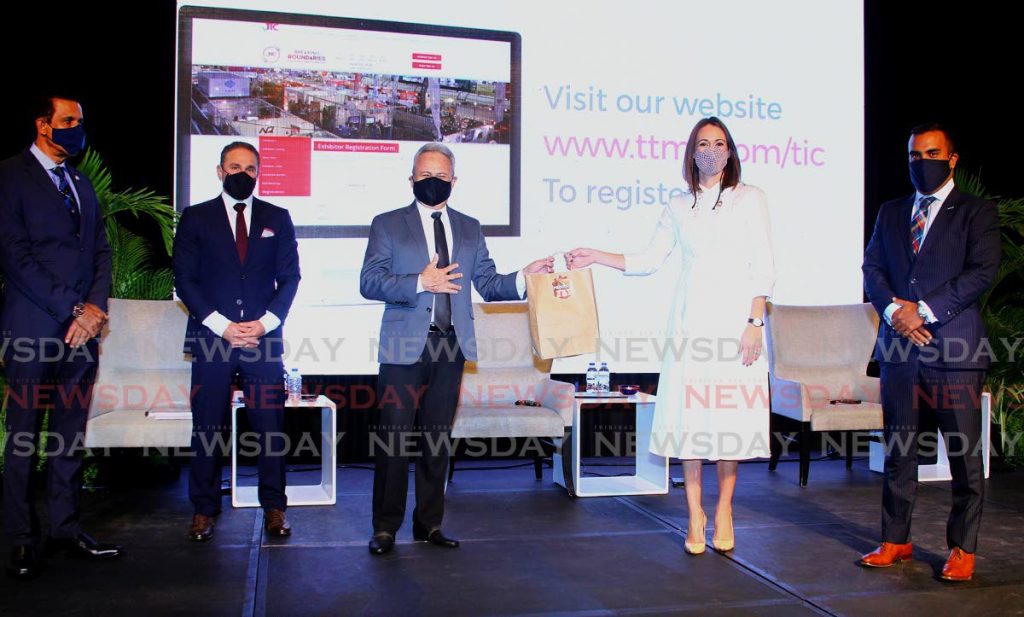Imbert gives manufacturers $50m export surprise

Finance Minister Colm Imbert gave manufacturers an unexpected but not unwelcome surprise Tuesday when he announced a new $50 million facility specifically geared to increase exports.
Speaking at the TT Manufacturers’ Association (TTMA) post-budget forum at the Hyatt Regency Port of Spain, Imbert said during the planning of the budget, he received a request from the Ministry of Trade for funds to assist exporters in growing foreign markets. “I can tell you now we’ve put $50 million into the Ministry of Trade’s allocation specifically for that for overseas market development and export promotion. This is purely for manufacturers,” he said. The ministry will determine the best way to invest the money, including ways to assist local manufacturers with crossing non-tariff barriers and even putting people on the ground in foreign countries to lobby on TT’s behalf.
Manufacturing was the engine of the economy, he said. “We are depending on the manufacturing sector to pull us out of the current situation.”
TT President Franka Costelloe, in a brief interview after the event, told Newsday the $50 million facility announcement was indeed a surprise but she was elated for it. “We feel it is a true reflection of Government’s genuine collaboration with business in pushing out export. (Increasing markets) in critical to diversification and the transformation of the economy. It shows support and confidence in the sector and it’s our responsibility now to take this and make the most of it,” she said.
The sector now has its work cut out, she said. She noted that the budget did reflect several of the organisation’s recommendations on the best way to create an enabling environment. “The ministry has given us tools. This is a difficult time and a hard budget for the minister but for him to allocate this and other resources shows a strong sense of collaboration between the government and the private sector,” she said.
In his budget on Monday, Imbert did note the country’s poor performance in ease of doing business, noting its 105 ranking out of 190 in the World Bank’s Doing Business Index. He called the impediments, including to inordinate lengths of time it takes to access permits and information, “totally unacceptable.”
Asked at the forum about Government’s plan for implementation, Imbert said it is up to individual ministries to implement but the Ministry of Finance would monitor. “We’ve highlighted (these shortcomings) and we are now going to drive the process by ensuring that everybody plays their part. The Ministry of Finance announces these things but it’s up to the other ministries to (implement). So, we on the level of the government will be evaluating and monitoring all of the ministries on a regular basis. That’s the only way to get it done. If you leave everything up to one group you will never be done. That’s why I took that initiative,” he said.
Mentioning it in the budget meant acknowledging there was a problem, he said. “These are bad things and it does affect ease of doing business… it’s one of the things that inhibits growth in TT. It is so difficult to get licences, permits, to even get an answer from a department. That is why we made the decision in the budget speech to say it is unacceptable and we will go after each one of the departments responsible to make sure it gets done,” Imbert said.
Costelloe said the government’s humility to recognise its responsibility in improving the public sector was “most illuminating.” “(They’re not just saying that it must (be done) but to recognise where the shortfalls are indicated they are measuring and now we have to work with them and let them know what are the new targets to facilitate business.”
Execution and implementation means clearly tracking against a target of where the country wants to go and the private sector will help Government set and reach those goals, she said. “Nobody knows it better than we do because that will help facilitate our own businesses. Increasing exports is our responsibility as a private sector. Creating an enabling environment is the responsibility of Government but finding and increasing the exports and that market share is the responsibility of the private sector.”
Asked if this budget, and the apparent embrace of the private sector, was the start of something different from the government, Imbert said it was a different approach. “This is not an easy situation we are in at all. The private sector keeps telling us if we give them incentives they will increase investment and growth, so we’ll see. We are trying.”


Comments
"Imbert gives manufacturers $50m export surprise"